Betriebliche Dynamiken und Beschäftigungsergebnisse
Firmengründungen und -schließungen sind in einer Marktwirtschaft für die Reallokation von Ressourcen, strukturellen Wandel und damit für die wirtschaftliche Entwicklung von zentraler Bedeutung und spielen vor allem im Hinblick auf die wirtschaftliche Transformation Ostdeutschlands eine zentrale Rolle. Gleichzeitig können die mit dem Strukturwandel verbundenen Arbeitsplatzverluste dramatische Folgen für betroffene Arbeitnehmer haben, wie z.B. Arbeitslosigkeit, Einkommensverluste oder eine geringere Arbeitsplatzqualität. Diese Forschungsgruppe untersucht mithilfe mikroökonometrischer Methoden Gründungen, Wachstumsprozesse und das Scheitern von Unternehmen, die Anzahl und Qualität der von Neugründungen geschaffenen Arbeitsplätze und die Folgen von Firmenschließungen für betroffene Arbeitnehmer und Arbeitnehmerinnen, vor allem in Bezug auf Arbeitsmarktergebnisse wie Beschäftigung und Löhne.
Forschungscluster
Produktivität und InstitutionenIhr Kontakt

Mitglied - Abteilung Strukturwandel und Produktivität
PROJEKTE
01.2020 ‐ 06.2024
Europas populistische Parteien im Aufwind: die dunkle Seite von Globalisierung und technologischem Wandel?
VolkswagenStiftung
Die Globalisierung hat zwar allgemein den Wohlstand gesteigert, aber in vielen Regionen Europas auch zu Arbeitslosigkeit, Lohnungleichheit, Abwanderung und Überalterung geführt. Das Projekt untersucht, ob diese ökonomischen Lasten zu Wählerstimmen für populistische Parteien führen.
01.2019 ‐ 06.2022
MICROPROD („Raising EU Productivity: Lessons from Improved Micro Data“)
Europäische Kommission
Ziel von MICROPROD ist es, zu einem besseren Verständnis der Herausforderungen beizutragen, die die vierte industrielle Revolution in Europa mit sich bringt. Verliert das Produktivitätswachstum im Kontext von Globalisierung und Digitalisierung an Schwung, und wenn ja, warum?
This project has received funding from the European Union’s Horizon 2020 research and innovation programme under grant agreement No 764810.
07.2018 ‐ 12.2020
Firmenlohndifferentiale in unvollkommenen Arbeitsmärkten: Die Rolle von Marktmacht und industriellen Beziehungen in der Aufteilung der Beschäftigungsrenten zwischen Arbeitnehmern und Arbeitgebern
Deutsche Forschungsgemeinschaft (DFG)
Ziel dieses Projekts ist es, die Aufteilung der Beschäftigungsrenten auf unvollkommenen Arbeitsmärkten und den Einfluss von Arbeitsmarktinstitutionen wie Tarifbindung und betrieblicher Mitbestimmung auf Firmenlohndifferentiale zu untersuchen. Über die Grundlagenforschung hinaus hat das Projekt damit Potential, wichtige wirtschaftspolitische Debatten zur institutionellen Ausgestaltung des Lohnfindungsprozesses zu informieren.
02.2019 ‐ 09.2019
Auswertung des IAB-Betriebspanels 2018 und Erstellung eines Ergebnisberichts für West- und Ostdeutschland
04.2016 ‐ 03.2019
Lohn- und Beschäftigungseffekte von Insolvenzen
Deutsche Forschungsgemeinschaft (DFG)
Ziel des Projekts ist es, erstmals den Prozess und die Folgen des Scheiterns von Unternehmen ausführlich zu analysieren. Insbesondere ist es im Rahmen dieses Projekts erstmals möglich, die Folgen kleinbetrieblicher Insolvenzen zu erforschen, was vor allem deshalb relevant ist, weil Arbeitnehmer in Betrieben mit weniger als zehn Beschäftigten etwa viermal so häufig von Insolvenzen betroffen sind wie Arbeitnehmer in Großbetrieben.
01.2018 ‐ 12.2018
Auswertung des IAB-Betriebspanels 2017 und Erstellung eines Ergebnisberichts für West- und Ostdeutschland
01.2017 ‐ 09.2017
Auswertung des IAB-Betriebspanels 2016 und Erstellung eines Ergebnisberichts für West- und Ostdeutschland
Referierte Publikationen
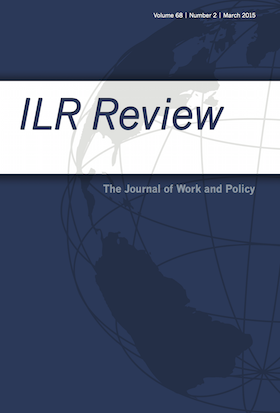
Works Councils and Establishment Productivity
in: ILR Review, Nr. 4, 2012
Abstract
Declining union density in many industrialized countries increases interest in alternative forms of employee representation, such as works councils. The German works council is one of the most powerful forms of worker representation in developed countries, but little is known of its causal effect on productivity. The author used a large linked employer-employee panel data set to examine this issue. Comparing firms with and without a works council, the author finds that establishments with a works council are on average 6.4% more productive; but he also presents evidence that this figure underestimates the true productivity effect of works councils.
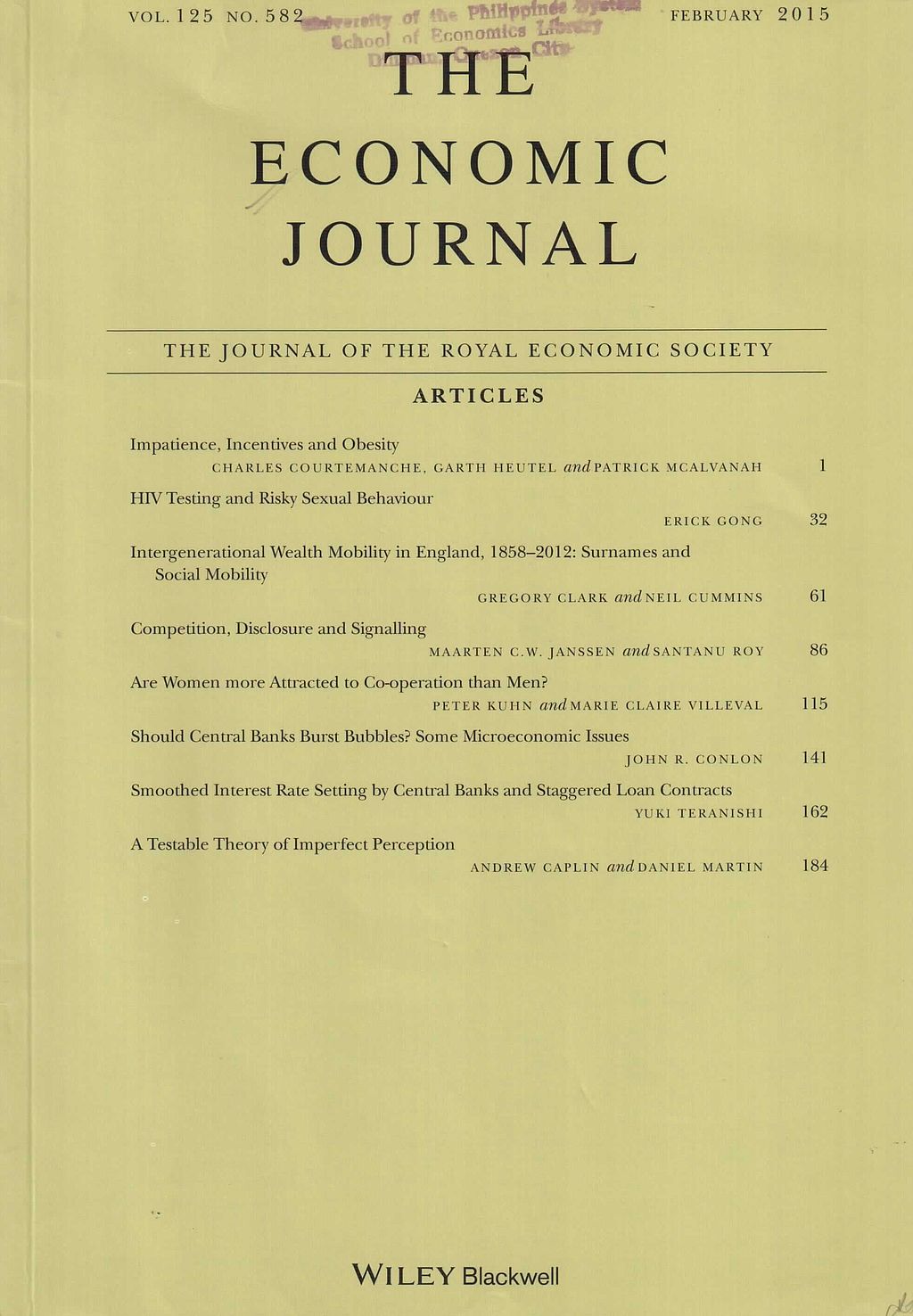
The Productivity Effect of Temporary Agency Work: Evidence from German Panel Data
in: Economic Journal, Nr. 562, 2012
Abstract
This study investigates the effect of temporary agency work on the user firm’s productivity. We hypothesise that using temporary agency work to enhance numerical flexibility and to screen job candidates may increase productivity, whereas temporary workers’ lower firm-specific human capital and spillover effects on the user’s permanent employees may adversely affect productivity. Other than the sparse existing literature on this issue, we exploit a large panel data set and control for time-invariant and time-varying unobserved heterogeneity by using the system GMM estimator. We find a robust hump-shaped effect of the extent of temporary agency work on the user firm’s productivity.
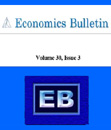
Do Women Benefit from Competitive Markets? Product Market Competition and the Gender Pay Gap in Germany
in: Economics Bulletin, Nr. 2, 2012
Abstract
Using a large linked employer–employee dataset for Germany with a direct plant-level measure of product market competition and controlling for job-cell fixed effects, we investigate whether relative wages of women benefit from strong competition. We find that the unexplained gender pay gap is about 2.4 log points lower in West German plants that face strong product market competition than in those experiencing weak competition, whereas no such link shows up for East Germany.
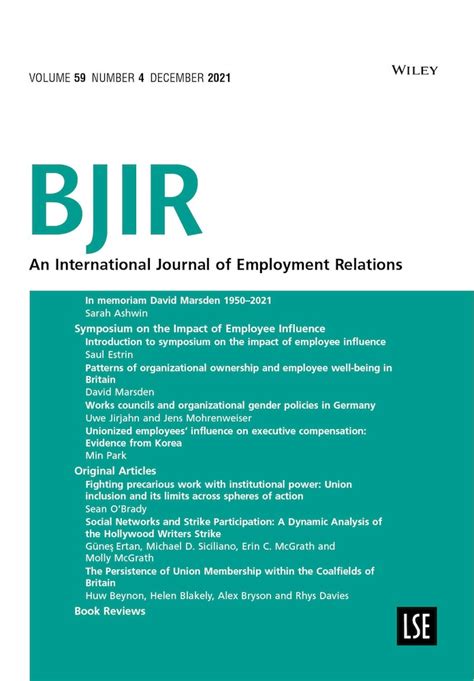
Works Councils and Firm Profits Revisited
in: British Journal of Industrial Relations, Nr. 1, 2011
Abstract
As they are employee associations, it is typically presumed that works councils redistribute economic rents from firm owners to workers. And indeed, the empirical literature suggests that German works councils reduce profits. The studies on the profitability effect of works councils mainly use self-reported subjective profit evaluations of managers as the dependent variable. I argue that these are poor measures of real profits. Newly available information on firms' capital stock allows me to revisit the profit effect now using an objective profit measure. When utilizing the subjective measure I find the standard results; with the objective measure, however, the works council effect on profits is positive and significant.
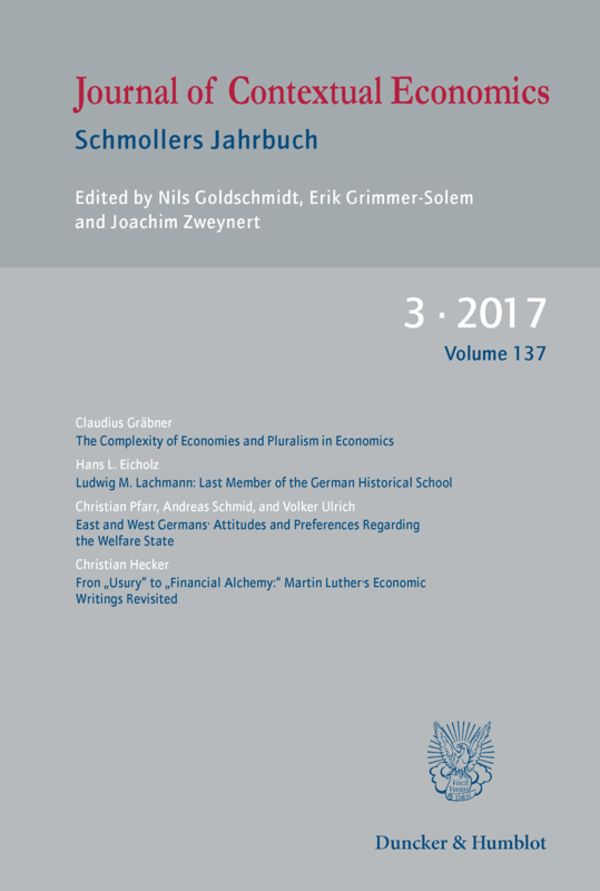
Betriebsräte und betriebliche Produktivität
in: Schmollers Jahrbuch, Nr. 1, 2011
Abstract
Betriebliche Mitbestimmung der Arbeitnehmer durch Betriebsräte ist ein zentrales Element der industriellen Beziehungen in Deutschland. Dennoch besteht trotz langjähriger Forschung keine Einigkeit über ihre Wirkung auf die betriebliche Produktivität. In diesem Papier wird zunächst der statistische Zusammenhang zwischen Betriebsrat und Produktivität mit Hilfe des IAB Betriebspanels empirisch untersucht. Betriebe mit Betriebsrat erweisen sich als um 9 Prozent produktiver. Es wird anhand der Ergebnisse dieser und anderer Studien argumentiert, dass die Wirkung von Betriebsräten auf die Produktivität den geschätzten statistischen Zusammenhang übersteigt.
Arbeitspapiere
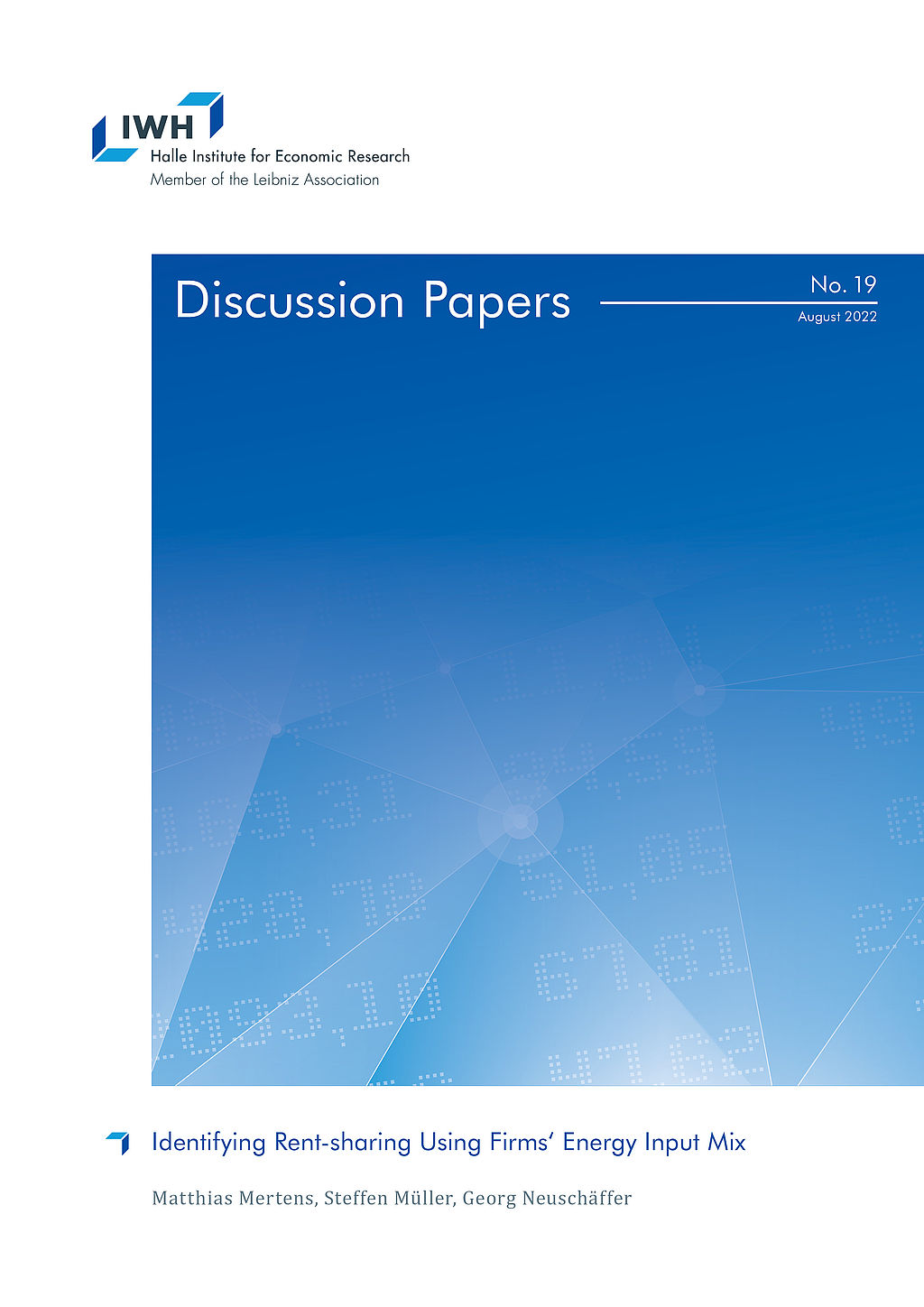
Identifying Rent-sharing Using Firms' Energy Input Mix
in: IWH Discussion Papers, Nr. 19, 2022
Abstract
We present causal evidence on the rent-sharing elasticity of German manufacturing firms. We develop a new firm-level Bartik instrument for firm rents that combines the firms‘ predetermined energy input mix with national energy carrier price changes. Reduced-form evidence shows that higher energy prices depress wages. Instrumental variable estimation yields a rent-sharing elasticity of approximately 0.20. Rent-sharing induced by energy price variation is asymmetric and driven by energy price increases, implying that workers do not benefit from energy price reductions but are harmed by price increases. The rent-sharing elasticity is substantially larger in small (0.26) than in large (0.17) firms.
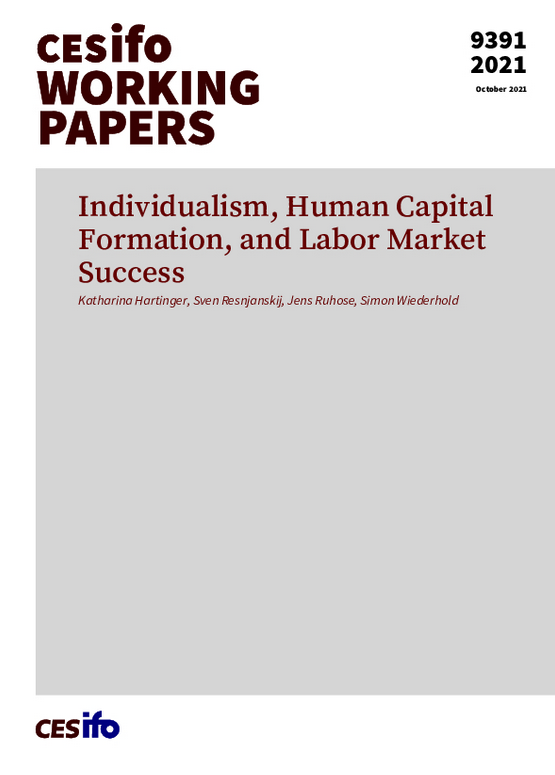
Individualism, Human Capital Formation, and Labor Market Success
in: CESifo Working Paper, Nr. 9391, 2021
Abstract
There is an ongoing debate about the economic effects of individualism. We establish that individualism leads to better educational and labor market outcomes. Using data from the largest international adult skill assessment, we identify the effects of individualism by exploiting variation between migrants at the origin country, origin language, and person level. Migrants from more individualistic cultures have higher cognitive skills and larger skill gains over time. They also invest more in their skills over the life-cycle, as they acquire more years of schooling and are more likely to participate in adult education activities. In fact, individualism is more important in explaining adult skill formation than any other cultural trait that has been emphasized in previous literature. In the labor market, more individualistic migrants earn higher wages and are less often unemployed. We show that our results cannot be explained by selective migration or omitted origin-country variables.
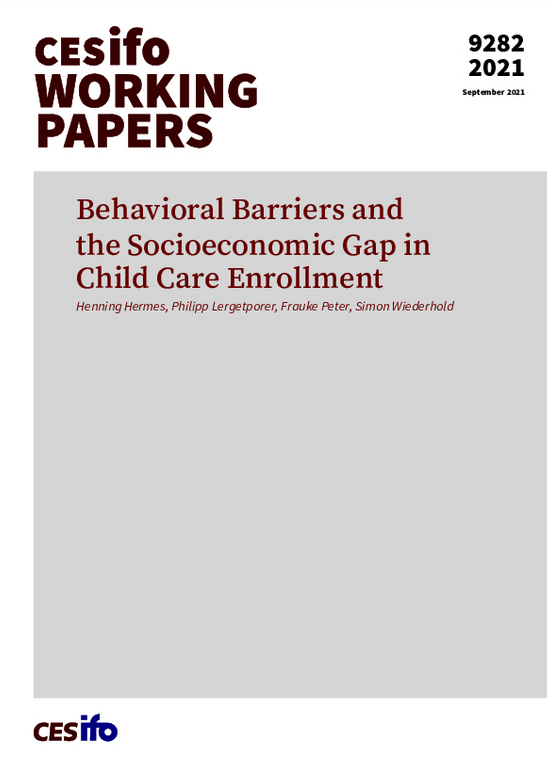
Behavioral Barriers and the Socioeconomic Gap in Child Care Enrollment
in: CESifo Working Paper, Nr. 9282, 2021
Abstract
Children with lower socioeconomic status (SES) tend to benefit more from early child care, but are substantially less likely to be enrolled. We study whether reducing behavioral barriers in the application process increases enrollment in child care for lower-SES children. In our RCT in Germany with highly subsidized child care (n > 600), treated families receive application information and personal assistance for applications. For lower-SES families, the treatment increases child care application rates by 21 pp and enrollment rates by 16 pp. Higher-SES families are not affected by the treatment. Thus, alleviating behavioral barriers closes half of the SES gap in early child care enrollment.
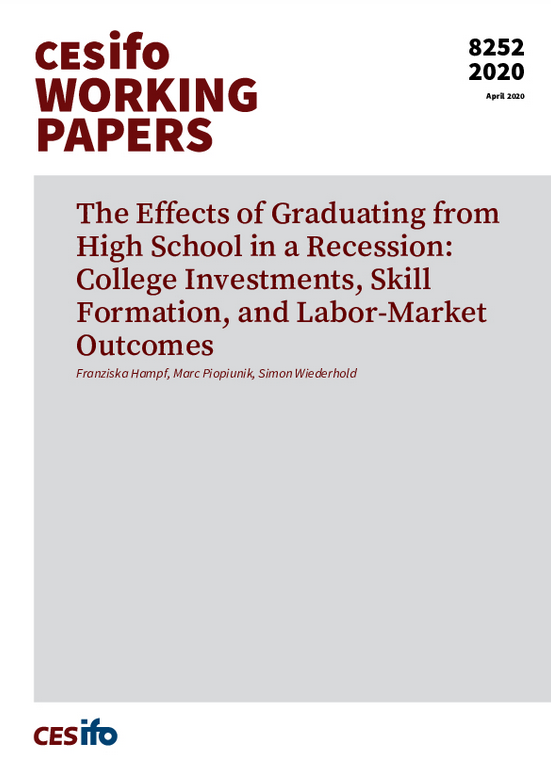
The Effects of Graduating from High School in a Recession: College Investments, Skill Formation, and Labor-Market Outcomes
in: CESifo Working Paper, Nr. 8252, 2020
Abstract
We investigate the short- and long-term effects of economic conditions at high-school graduation as a source of exogenous variation in the labor-market opportunities of potential college entrants. Exploiting business cycle fluctuations across birth cohorts for 28 developed countries, we find that bad economic conditions at high-school graduation increase college enrollment and graduation. They also affect outcomes in later life, increasing cognitive skills and improving labor-market success. Outcomes are affected only by the economic conditions at high-school graduation, but not by those during earlier or later years. Recessions at high-school graduation narrow the gender gaps in numeracy skills and labor-market success.

Identifying Bankruptcies in German Social Security Data
in: FDZ-Methodenreport, Nr. 10, 2017
Abstract
In empirischen Studien über Firmenschließungen wird häufig die Notwendigkeit betont, zwischen verschiedenen Arten von Schließungen, z.B. freiwilligen und unfreiwilligen, zu unterscheiden. Dieser Methodenreport erläutert vor diesem Hintergrund, wie im Betriebs-Historik-Panel (BHP) Betriebsstillegungen aufgrund von Insolvenzen identifiziert werden können. Insolvenzen können im Gegensatz zu anderen Schließungen eindeutig als Ausdruck ökonomischen Scheiterns und somit als unfreiwillige Schließungen interpretiert werden. (Autorenreferat, IAB-Doku)


















